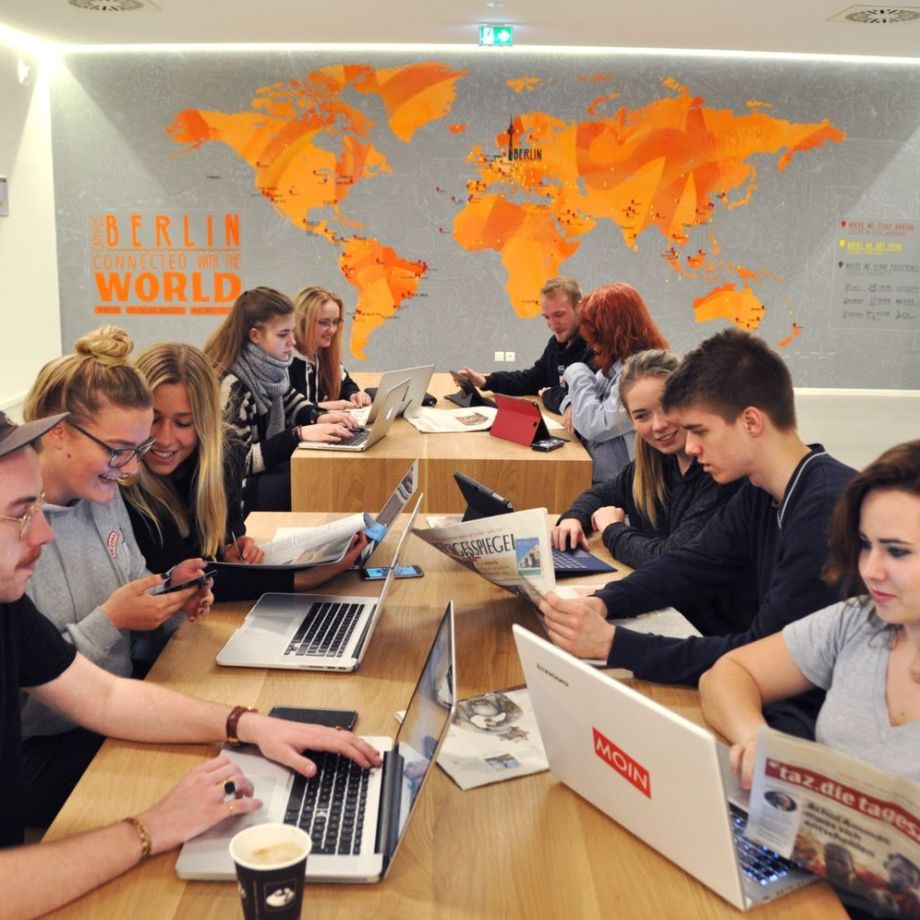
The digital world isn’t just changing — it’s being transformed by artificial intelligence. As businesses lean more heavily on digital media management to engage audiences, demand for skilled professionals keeps growing.
If you’re looking to build a career that can adapt to this shift, picking the right degree becomes crucial.
A BSc Digital Media and Marketing degree has become one of the strongest routes forward, particularly in tech-savvy Germany. This guide covers why this programme matters, what you’ll actually learn, and how it prepares you for the AI-driven job market.

What is a BSc in Digital Media & Marketing?
This focus on practical skills is especially relevant in Germany, where digital marketing expenditure has surged to €30.9 billion in 2024, with a consistent upward trend since 2018.
With a BSc Digital Marketing degree, you’ll learn to create engaging digital stories while mastering the metrics that show whether they're actually working. A digital media and marketing curriculum typically covers:
Digital Media & Communication: Delve into the strategies and channels used for effective online communication, which is the bedrock of all digital media management.
Marketing, Sales & CRM: Gain a thorough understanding of fundamental marketing principles, sales techniques, and how to use Customer Relationship Management systems to nurture long-term customer loyalty.
Digital Transformation: This essential area teaches how businesses adapt and thrive by integrating digital technologies across all areas, a key driver in today's AI-driven job market.
Content Production: Moving from theory to practice, you will gain hands-on skills needed to create professional-grade digital content.
Applied Research Project: Tackle a real-world business challenge, applying AI skills for digital marketing and analytical methods to propose data-backed solutions.
This blend of creative thinking and data analysis gives you the versatility to tackle whatever marketing challenges come your way.

Why is Digital Media Management Essential in Today’s AI-Driven Job Market?
An effective manager now needs to work with AI-powered analytics platforms, manage chatbot integrations, and make the most of programmatic advertising. AI isn't replacing managers — it's pushing them to become more tech-savvy and strategic. Companies want professionals who can connect creative campaigns with the algorithms behind them. Without proper training in these areas, like through a dedicated BSc Digital Marketing programme, keeping up with these rapid changes becomes much tougher.
Factors to Consider When Choosing a Bachelor’s Degree in Digital Media & Marketing
When it comes to digital media and marketing, the right degree should strike a balance between theory, practice, and industry relevance. To help guide your decision, here are some of the most important factors to consider:
- Curriculum Relevance: Does the course cover contemporary topics like digital media, data privacy laws (like GDPR in Europe), and automation tools? Ensure it’s not just teaching outdated models.
- Faculty Expertise: Are the professors industry veterans with real-world experience? Learning from those who have practised digital media management is invaluable.
- Practical Exposure: Look for programmes that offer live projects, internships, and access to industry-standard software. Theory must be paired with practice.
- Industry Connections: A university with strong ties to businesses can provide superior networking opportunities, guest lectures, and placement prospects.
- Location: Studying digital marketing in Germany offers direct access to Europe’s largest economy, a hub for innovation and home to countless multinational corporations and startups.
Essential Skills You’ll Gain in a BSc Digital Media & Marketing Programme
Enrolling in a quality BSc Digital Media and Marketing programme equips you with a powerful blend of hard and soft skills crucial for media management careers, such as:
- Technical Proficiency: Mastery of tools like Adobe Creative Suite, Google Analytics, CRM platforms (e.g., Salesforce), and emerging AI content generators.
- Data Literacy and Analytical Thinking: The ability to interpret data sets, derive consumer insights, and make informed decisions to optimise campaign performance.
- Strategic Content Planning: Skills to develop a content calendar, manage a brand’s voice across channels, and execute a multi-touchpoint campaign.
- Understanding of AI and Automation: Knowledge of how AI algorithms work for ad bidding, personalisation, chatbots, and predictive analytics, all key AI skills for digital marketing.
- Cross-Cultural Communication: Especially in an international environment like Germany, you learn to create campaigns that resonate with a global audience.
How is AI Transforming Roles in Digital Media and Management?
AI is not a distant future concept; it’s actively transforming roles in digital media and marketing by automating processes and making hyper-personalisation possible. In digital media management, AI-driven tools like generative AI create content faster, with 70% of marketers trusting it for search optimisation. Roles such as AI Marketing Strategist are emerging, focusing on data analytics and automation.
In content creation, AI tools have become essential helpers. They generate copy variations, create accurate video subtitles, and even produce basic graphics. This automation frees you up to focus on higher-level creative strategy, big-picture branding, and developing compelling narratives.
Furthermore, customer service has also been streamlined through AI-powered chatbots that handle routine queries instantly. This improves response times and lets you focus your expertise on more complex, high-value customer issues.
Why Choose a BSc in Digital Media and Marketing at UE Germany?
Our BSc Digital Media & Marketing programme is built for the digital-first world, where creativity meets technology and data drives every decision. Whether your goal is to launch global campaigns, lead cross-media projects, or harness AI for smarter marketing, our degree equips you with the skills and mindset to thrive.
Located at the Innovation Hub in Potsdam — just outside Berlin’s thriving startup scene — our programme offers an international environment for creativity and innovation with a curriculum that keeps you ahead of the curve.
You’ll explore emerging areas like artificial intelligence, big data, virtual reality, and programmatic advertising while building your knowledge across business administration, media, and communication — all while developing practical management skills.
UE graduates find themselves in high demand as Brand Managers, Content Managers, and Crossmedia Managers across industries, from corporate communications and market research to film production and NGOs. Your solid business management foundation and AI skills for digital marketing also open doors to advanced leadership roles right from the start.
Conclusion
The combination of digital media management and artificial intelligence has opened up new territory for marketers. Pursuing a BSc Digital Media and Marketing degree goes beyond just earning a qualification — you’re building a set of skills that will stay relevant as the industry evolves.
By choosing a programme that balances strategic creativity with technical know-how, particularly in an innovative country like Germany, you put yourself at the centre of this shift.
Instead of just watching the digital transformation happen, you become someone who helps shape it.